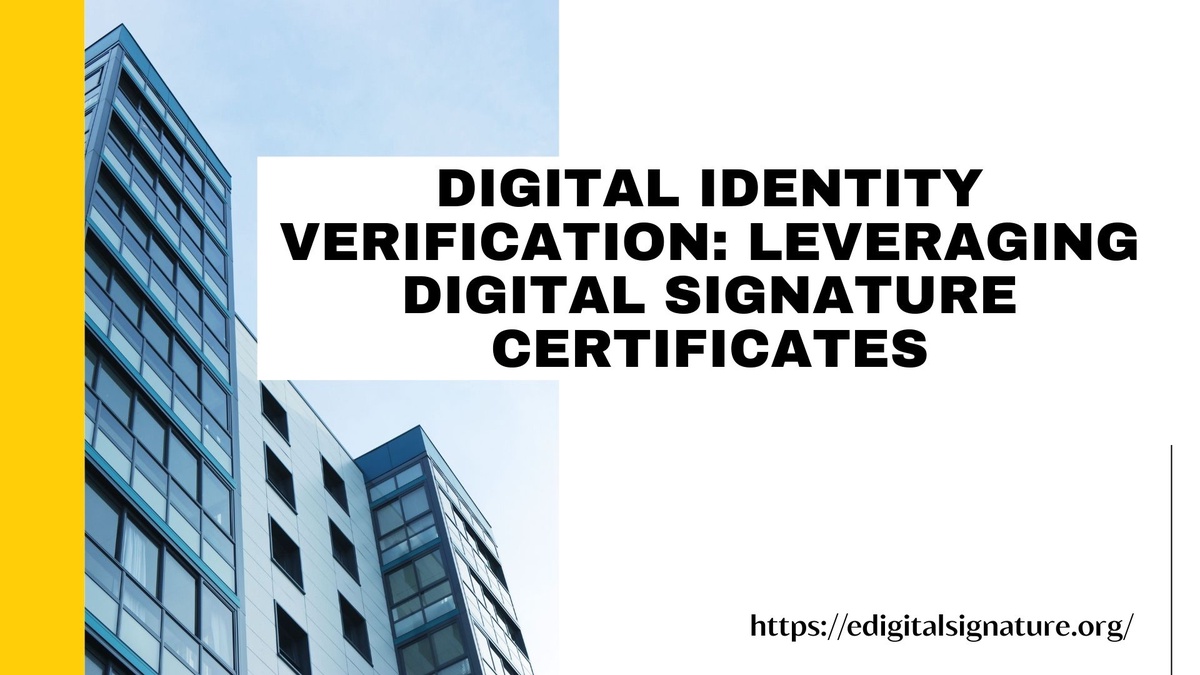Introduction
In today's interconnected world, where online transactions and interactions have become the norm, ensuring secure and reliable digital identity verification is of paramount importance. Traditional methods of identification, such as physical documents and signatures, are being rapidly replaced by digital solutions that offer enhanced convenience and security. One such powerful tool in the realm of digital identity verification is the Digital Signature Certificate (DSC). In this article, we will delve into the significance of DSCs and explore how they are revolutionizing the process of authenticating digital identities.
Understanding Digital Signature Certificates
A Digital Signature Certificate is an electronic form of identification that is issued by a trusted authority, known as a Certifying Authority (CA). It serves as a digital equivalent of a handwritten signature and provides an assurance that the message or document in question has not been tampered with since it was digitally signed. A DSC contains the owner's public key, cryptographic information, and other relevant details, all of which are used to verify the authenticity and integrity of the signer.
The Role of Digital Signature Certificates in Identity Verification
- Ensuring Authentication: One of the primary purposes of a DSC is to establish the identity of the signer. By utilizing advanced cryptographic techniques, the DSC validates the identity of the individual or entity behind the digital signature. This authentication process enables businesses, organizations, and individuals to verify the legitimacy of the signatory and build trust in the digital realm.
- Maintaining Integrity: Digital Signature Certificates play a crucial role in maintaining the integrity of digital documents and transactions. When a document is digitally signed using a DSC, any alteration made to the document after the signature will be detected. The cryptographic algorithms embedded in the certificate ensure that even minor modifications to the document will result in a failed verification process. This feature provides an additional layer of security and protects against fraud and unauthorized changes.
- Non-Repudiation: Non-repudiation is a vital aspect of digital transactions, especially in legal and financial contexts. A DSC provides non-repudiation by ensuring that the signer cannot deny their involvement in the signed document or transaction. The digital signature serves as concrete evidence of the signer's intent and cannot be repudiated without undermining the integrity of the entire system.
Benefits and Applications of Digital Signature Certificates
- Streamlined Business Processes: Incorporating DSCs in various business processes eliminates the need for physical paperwork and manual signatures. This not only saves time and resources but also enables seamless electronic transactions, reducing operational costs and improving efficiency. Industries such as banking, insurance, legal, and e-commerce can significantly benefit from the use of DSCs in streamlining their workflows.
- Secure Communication: Digital Signature Certificates enable secure communication by ensuring the authenticity and integrity of digitally signed emails and other electronic documents. By digitally signing an email, the sender can guarantee that the content remains unaltered during transmission and that the recipient can trust the source of the message.
- Compliance with Legal and Regulatory Frameworks: Many countries have established legal frameworks and regulations that recognize the validity and enforceability of digital signatures. Digital Signature Certificates, issued by recognized Certifying Authorities, comply with these frameworks, making them legally binding and admissible in courts of law. This facilitates secure and legally recognized digital transactions, eliminating the need for physical presence and paperwork.
Challenges and Future Developments
While Digital Signature Certificates offer numerous benefits, their adoption still faces certain challenges. Key challenges include awareness among users, standardization of processes, and interoperability among different digital signature platforms. However, with advancements in technology and increasing digital literacy, these challenges can be overcome.
Looking ahead, the future of digital identity verification lies in the continued evolution of DSCs and related technologies. Enhanced encryption algorithms, biometric authentication, and blockchain-based solutions are some of the exciting developments on the horizon. As organizations and individuals embrace digital transformation, the reliance on secure and reliable digital identity verification will only continue to grow.
Suggested Read: Apply for Digital Signature Certificate Online
Conclusion
Digital Signature Certificates are transforming the landscape of digital identity verification by providing a secure and reliable means to authenticate digital transactions and communications. With their ability to ensure authentication, maintain integrity, and provide non-repudiation, DSCs offer significant advantages over traditional methods of identification. By streamlining business processes, enabling secure communication, and complying with legal frameworks, DSCs are revolutionizing how we conduct digital interactions. As we navigate the digital age, the continued evolution and adoption of Digital Signature Certificates will play a crucial role in ensuring trust, security, and efficiency in our increasingly interconnected world.


No comments yet